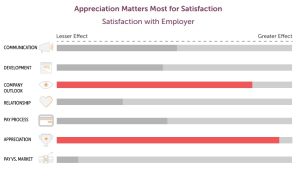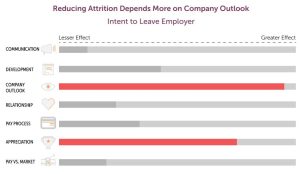Maybe your paycheck isn’t what gets you out of bed in the morning, but nobody would come into work if the money stopped flowing. Pay is the most basic way to motivate employees, but how much does pay matter relative to other factors that influence employee engagement?
PayScale, the company where I work, was interested in learning more about the relationship between pay and engagement, so my team took this question to the PayScale salary database. Between 2015 and 2017, we collected survey responses from more than 500,000 workers in the US. This included information about their job title, education, compensation, age, and their feelings on eight engagement criteria. For the engagement data, workers rated statements from “Strongly Disagree” to “Strongly Agree” on a five-point scale. We asked two questions to this dataset: what makes an employee satisfied at work, and what makes them plan on sticking around? (For the full set of prompts, see the full report.)
 Two variables stood out from the pack for both outcomes: whether an employee feels appreciated at work, and whether they feel their organization has a bright future. Employees who feel unappreciated or who think their organization isn’t going anywhere are less likely to feel satisfied at work and more likely to plan on seeking a new job in the next six months.
Two variables stood out from the pack for both outcomes: whether an employee feels appreciated at work, and whether they feel their organization has a bright future. Employees who feel unappreciated or who think their organization isn’t going anywhere are less likely to feel satisfied at work and more likely to plan on seeking a new job in the next six months.
Next, we analyzed at the role compensation plays in employee engagement in two different ways: how people are paid relative to the labor market for their position, and how they feel about the process through which pay is determined at their organization. Each of these variables affects satisfaction and intent to leave the organization in the way you would expect – getting paid better relative to the market and feeling better about the pay process are both associated with higher levels of satisfaction and lower intent to leave.
We learned something very surprising – how employees feel about the pay process matters more than how their pay compares to the labor market for similar positions – much more, in fact. In addition, we saw that improving the transparency and fairness of the pay process is 65% more effective at reducing intent to leave than paying employees more relative to the m arket. The disparity is even more dramatic for employee satisfaction – the effect of pay process is 5.4 times as large as the effect of pay vs. market for improving a worker’s satisfaction with their employer.
arket. The disparity is even more dramatic for employee satisfaction – the effect of pay process is 5.4 times as large as the effect of pay vs. market for improving a worker’s satisfaction with their employer.
This is consistent with our previous research which showed just that employees have negatively skewed beliefs about their pay. Only people that are underpaid tend to have an accurate view of how their pay compares to the market. Since workers tend to be pessimistic about their pay, it makes sense that paying at or above the market would have a limited impact on employee engagement unless the employer does an effective job of communicating how and why they determine appropriate pay.
What It Means at Your Company
If someone asked at a cocktail party how your organization paid, how would employees respond? This sentiment is what we call an organization’s “Pay Brand.” It’s an uncomfortable fact that your former, current, and prospective employees all have something to say around pay, and – for many companies – much of it isn’t positive. HR managers can best influence the conversation (and whether comments reflect reality) by clearly articulating, communicating and following a compensation philosophy. Here are some things you can do to make your organization more strategic about pay:
Make a conscious choice about pay transparency — Transparency around pay does not necessarily mean publishing everybody’s pay stub, and finding the right level depends on your organization’s location, industry, and culture. To build trust with your employees surrounding pay, you need a clear reason for choosing the level of information available about how their pay compares to others within the company and to similar jobs elsewhere.
Articulate your compensation philosophy — Compensation philosophy quickly communicates the “why” behind compensation policies. A good philosophy statement also serves as the bridge between the “what” or “how” and the underlying company culture that you want to create. One critical step in getting comp right is making sure you’ve landed on a statement that effectively answers the question “why?” in a way that is consistent with your culture. SHRM provides a guide for what these statements should accomplish, and where you should start.
Train managers have comp-versations — The rubber hits the road when front-line managers talk to their reports about compensation. These conversations are sometimes difficult. You don’t want managers skimming over the issue of compensation or worse, skirting it entirely. Our research highlights that getting this part right actually matters more than the level of the increase itself. This is a good opportunity for managers to explain not just the what, but the how and the why—what the pay numbers are, and how they were determined. For example, which behaviors, skills, and responsibilities lead to increased compensation in your organization. Open and transparent communication around pay builds trust. Make sure your managers know how to handle these conversations, from understanding the organization’s compensation philosophy to handling common objections or concerns.
